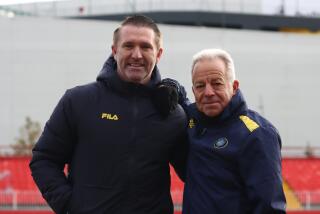Africans cheer for their teams, their continent, despite a lack of faith
- Share via
Reporting from Johannesburg, South Africa — Despite disappointment over the performance of Africa’s World Cup teams, the competition here appears to be bringing out a keen sense of Pan-African pride, a border-transcending spirit and attitude that one would almost surely not encounter on most other continents.
When any of the six African squads has scored a goal, shouts of joy have erupted across the continent, in exuberant food and beer joints like Mama’s Place in Lagos, Nigeria, in shops converted into mini-screening rooms in the narrow streets of Freetown, Sierra Leone, in the pubs of Nairobi, Kenya, and in open air, vuvuzela-infested parks in the townships of Johannesburg.
The idea of South Koreans rooting for Japan or the French cheering on England may be far-fetched. But in Africa, even those who don’t normally follow the game are praying that at least one African team will make it to the quarterfinal in the first World Cup on African soil. Or even to the round of 16.
“This is an African World Cup, and all the six teams flying the African flag deserve the support of all of Africa,” Sylvester Odia, a 25-year-old computer engineer, said between mouthfuls of spicy chicken pepper soup (the World Cup Special) at Mama’s Place, in Lagos.
Africa’s teams have wonderful names: Cameroon’s Indomitable Lions (who proved anything but indomitable, as Cameroon became the first of the 32 World Cup teams to fail to make it to the second round); Les Elephants (The Elephants) of Ivory Coast; Ghana’s Black Stars; Nigeria’s Super Eagles; Algeria’s Les Fennecs (The Desert Foxes) and South Africa’s Bafana Bafana (Boys Boys).
But inspirational names don’t always translate to success on the pitch. In the tournament’s 80-year history, no African team has ever made it past the quarterfinal. This year, only three teams are still in a position to have a shot at going to the next level, the round of 16.
Ghana, now leading Group D, has the best chance but must beat or tie Germany on Wednesday to ensure that it will forward. For Algeria to advance, it must beat the United States and England must lose. Ivory Coast’s chances are far slimmer.
South Africa, despite defeating France 2-1, Tuesday was eliminated from the tournament, becoming the first host nation to not make it into the second round. (A 3-0 loss to Uruguay last week proved impossible to overcome.)
Other teams have also been a disappointment: Cameroon has a long World Cup history but has never matched the heights of 1990 when it stole a 1-0 win over Diego Maradona’s Argentina. Nigeria is big nation in numbers and its youth teams have done well in international competition, but this year’s World Cup edition scored only once in its first two games, losing both. Didier Drogba may have had the cachet and influence to soothe civil war tensions in his native Ivory Coast two years ago but his team was uninspired against Portugal and looked terrible against Brazil.
When the final African teams are eliminated, many Africans say, they will root for their favorite players from around the world. But until then, they favor any team African.
“I watch football anywhere where there are fans cheering for their favorite teams. If Africans are playing I’ll be for any African team, because they’re Africans like me,” said Kennedy Mugambi, 25, a shoe hawker in a neighborhood outside Nairobi.
“Whenever Africans are playing I feel more attached to the game,” he said as he sat on the ground at a restaurant, his wares scattered around him, his eyes on the TV screen. “My best African team is Nigeria.”
Kennedy Omenda, 40, an employee of the state power utility, sneaked away from work to watch a game at the restaurant, where a sign outside read “No Idlers Allowed.” He likes Argentina for its star players, such as Lionel Messi, but is “100% behind Ghana because they’re Africans like me.”
“I feel as if the games are here in our own soil. To have the World Cup here in Africa makes me feel great.”
The match times are scrawled in chalk on a battered blackboard outside a stone shop in Kitengela town near Nairobi. A shabby black curtain in the doorway blocks out nearly all light. In the gloom, about 100 men are crammed together, shouting at a TV screen.
One of them, businessman Anthony Gitura, 34, called it a historic victory for Africa to host the tournament. But he was realistic about the chances of any African team and bemoaned the talent drain of top African players to Europe, where professional soccer players earn much more than in Africa.
“The World Cup is not an African affair. It’s so Westernized. The stars are from here [Africa] but the whole game is like for Europeans.”
Street trader Seyram Doe, 29, in Ghana’s capital, Accra, said none of the African teams had proved that African soccer had matured.
“The African teams have disappointed me,” she said. “I’ve been supporting them from the outset because it is the natural thing to do. The Black Stars show some promise but they haven’t been able to produce the scores that would show us that they can climb to the very top.”
In at least one African city, however, not everyone is caught up in the magic of Pan-Africanism or in the spectacle of the sport itself.
Long before the first World Cup match, hard-line Islamic preachers in Mogadishu, the capital of Somalia, declared that watching men run around in their shorts chasing a ball was a sin. Islamic groups that have seized control of portions of the city banned outdoor screens months ago.
“People won’t benefit from watching games so we ask them to refrain from gathering and shouting aimlessly like animals,” said Mohammed Osman Arus, spokesman of the rebel group Hizb al-Islam. “We never allow people to gather and watch naked men and women onscreen. Soccer games are just to kill the precious time that people should be using to go to worship God.”
As a result, some people meet secretly in friends’ houses to watch the games on satellite TV. For most, night games are out of the question: It’s not safe to venture outside after dark.
Said Hussein, 24, who lives the Sugaholaha neighborhood in the north of the city, is supporting Ghana. “I have my TV inside my room and watch the games there with some of my friends to avoid trouble.
“But when a goal is scored you have to remember not to shout out loud to celebrate it, otherwise the celebration could turn into silence,” Hussein said. Offenders could be arrested and publicly lashed.
Omar Yare, 21, plays soccer but has no TV. He feels frustrated sitting at home at night knowing that a World Cup game is being played on his own continent, but he can’t watch.
“You are always a victim of oppression when you don’t have a public place where you can go and watch the games freely.”
Special correspondents Nicholas Soi in Nairobi, Mustafa Haji Abdinur in Mogadishu, Segun Adeyemi in Lagos and Francis Kokutse in Accra contributed to this report.
More to Read
Go beyond the scoreboard
Get the latest on L.A.'s teams in the daily Sports Report newsletter.
You may occasionally receive promotional content from the Los Angeles Times.






